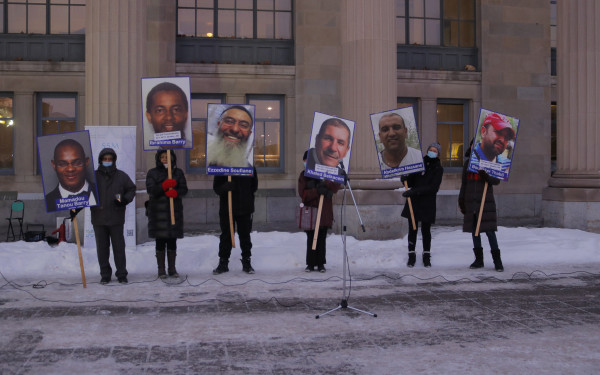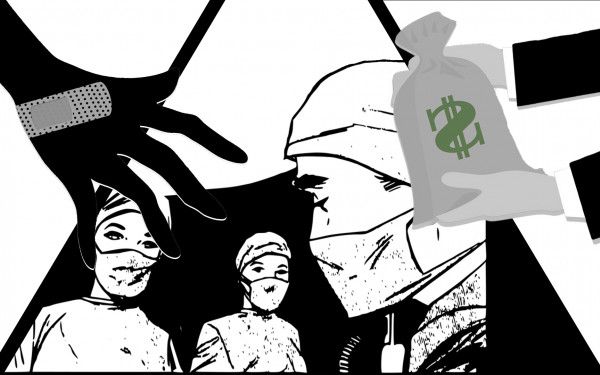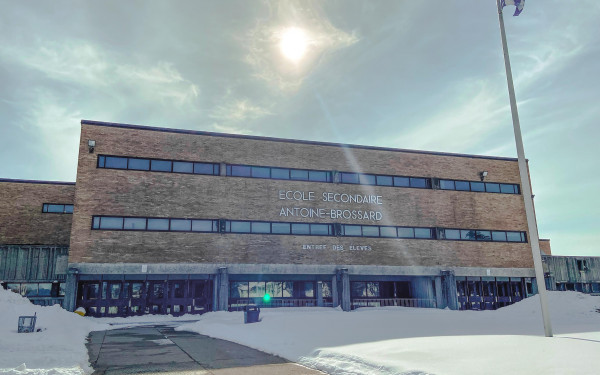Editorial: Islamophobia and racist systems create killers
This Friday, various Concordia groups, including the Concordia Student Union and the Multi-Faith and Spirituality Centre, came together to commemorate the fourth anniversary of the Quebec City Mosque shooting. Four years ago, on January 29, Ibrahima Barry, Mamadou Tanou Barry, Khaled Belkacemi, Aboubaker Thabti, Abdelkrim Hassane, and Azzedine Soufiane were killed in the attack.
The attacker was a former Royal Canadian Army Cadet, and those close to him knew he held far-right, anti-feminist, white-nationalist, and anti-Muslim views. In the month leading up to the shooting, he checked right-wing commentator Ben Shapiro’s Twitter account 93 times.
Mass killings are often automatically associated with the U.S., but Canada has proven that it is not immune to heinous killings. Canada’s culture of domination and alienation and the hateful ideologies it facilitates, not dissimilar to American culture, creates killers.
This domineering culture is not new. Starting in 1831, long after the first incursion of British and French colonizers, government-sponsored residential schools, rife with abuse, were established to assimilate Indigenous youth into Canadian culture. Tearing them from their families, the Catholic Church and Canadian government traumatized generations of Indigenous Peoples in this pursuit. The last residential school closed its doors in 1996.
This colonial and intergenerational trauma lives on today.
When thinking of discriminatory laws in Canada, Bill 21 quickly comes to mind. With the Coalition Avenir Québec in majority and backing from the Parti Québécois, the bill passed 73-35 on June 16, 2019. In the weeks leading up to this vote, protests sprung up around Montreal denouncing the bill as Islamophobic and aimed at Muslim women.
Riding the Islamophobic wave, white nationalists in Quebec have used Bill 21 as an excuse to organize and take action. From 2016 to 2017, police-reported hate crimes against Muslims more than doubled—from 139 cases to 349 cases.
This type of legislation at the provincial level legitimizes the views of far-right nationalists. Canada loves to view itself as a mosaic and not a melting pot, a place where people can express themselves freely and have their cultures represented—but how can this be true when Islamophobic laws poorly disguised as secularism are be enforced in a diverse city like Montreal?
Our systems are built on domination—colonialism, capitalism, and the ever-growing distance between politicians and people. These systems facilitate racist violence.
Domination is incompatible with community and breaks the connections that normally offer support. Mutual aid movements have sprouted up around Montreal during the pandemic, but they are just bandages on the overarching larger problem.
Disconnection creates alienation and anger. White men are empowered by these racist systems to unleash violence on the world around them.
Islamophobic laws like Bill 21, paired with a lack of gun control, creates the perfect concoction for anti-Muslim hate crimes and mass killings.
Needless to say, stricter gun control is the first step in reducing mass shootings. In terms of creating legislation that benefits minority communities, infrastructure should be put in place to encourage marginalized communities to pursue politics and leadership positions. A diverse assembly makes conscious decisions that represent the entire population and could pass anti-discriminatory legislation that reflects the multiculturalism of the country.
We cannot simply attribute tragedies like the Quebec City mosque shooting to the most deranged members of our society. Those who benefit from the entrenched systems that perpetuate racist violence and killing must chiefly take responsibility for reversing them, creating space for a safer, more equitable society to flourish.

.png)



3_600_375_90_s_c1.jpg)

